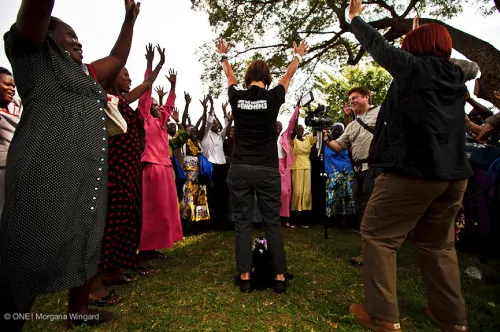This post may contain affiliate links. Read my disclosure policy here.
This post originally appeared on TheMotherhood.com and is part of the #ONEMoms Trip to Kenya.
Tuesday, July 26th, Nairobi, Kenya
Today was our second day focused on health, particularly women’s health, and we learned many things – most importantly: there is much work to do; possible budget cuts to US-funded programs put much of that work in jeopardy; tremendous progress has been made; and everyday heroes, who do extremely difficult healthcare work, are responsible for much of the progress.
Kayla Laserson, a director with the CDC in Kenya (and one of the most impressive, courageous, smart and inspiring people you can imagine) oversees a team of almost 1,000 people who tackle, everyday, the complex and seemingly insurmountable challenges posed by HIV, tuberculosis, malaria and many other diseases and health issues. We spent most of our time with Kayla and amazing members of her team and the improvements they are working to bring about are stunning.
How is progress made?
“Village Reporters” go door-to-door, village to village, to check on, monitor and care for local expectant mothers, among others. We met a few dozen Village Reporters today, and they greeted us with a song and a dance to let us know how proud they were of the work they do. Their jobs are profoundly important in their communities- they are the front line of healthcare for so many – and their job includes monitoring the safety of anti-malarial drugs used in pregnancy, counseling on and encourage families to use community health services for HIV and other diseases and keeping track of the general health and welfare of their neighbors.
Home Healthcare workers test families for HIV, and then follow-up – regularly and often – on care and treatment. Imagine a job in which you implement rapid HIV tests and then have to be prepared to counsel a family through the outcome of that test. And then imagine doing that in home after home, day after day. The women we met handled their jobs with huge stamina, energy, pride, wisdom and a dash of humor too. Remarkable.
Tuberculosis (TB) Ambassadors, often working as volunteers, care for TB patients in-home, every, single day for at least six months, which is the typical duration of the TB medical treatment. As one TB Ambassador told us, as a TB survivor herself, she’s dedicated her life to helping those who suffer from the disease to help “lift up those who are down.” TB is a devastating disease, killing 200 people an hour worldwide. Kenya carries one of the highest burdens of TB globally but through the TB Ambassador program, TB patients are given the attention, counsel and support they need to complete their long and difficult treatment process and get on a road to recovery.
Women taking care of women
We all know it and see it — women take a care of each other, mothers take care of each other – no matter what side of the earth you happened to be born. We got to know women today who try with all their hearts, minds, talents and will to make life for their neighbors a little better. They do the hard, daunting work because they’ve “been there”, because they feel it is right thing to do, because they love their community and because in their DNA – as women and mothers – they are called to make their world better than they found it.
Please take part in today’s daily action and join us in celebration of community heroes in Kenya and everywhere:
Day 2: Using the hashtag #ONEMoms, tweet a message (or messages) you’d like us to deliver to mothers in Kenya.










Tours in Kenya says
Health care is the most important thing for human and especially for women’s. Mother take care of her family and women will help to others. I’m feeling great to read your blog and is looking great with the video and snapshot. Keep up blogging.!!!